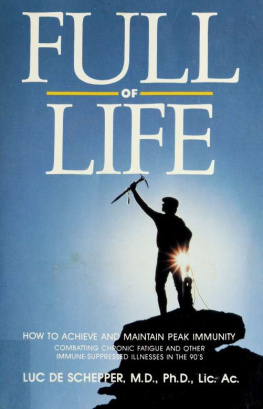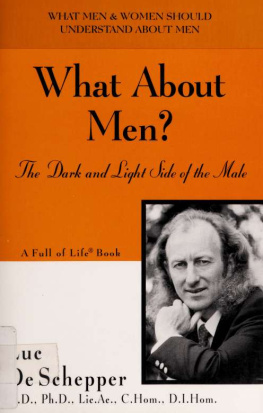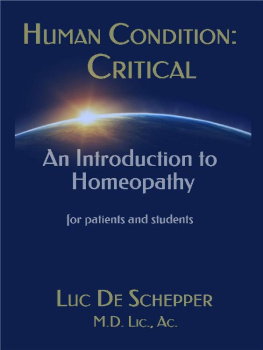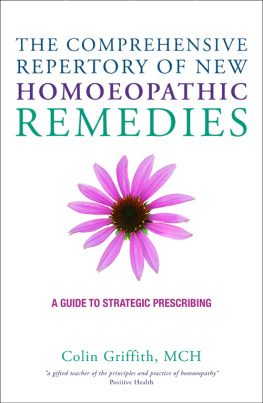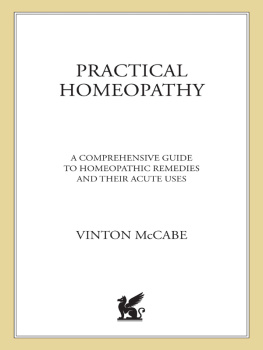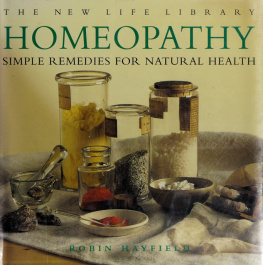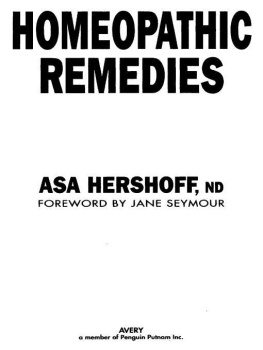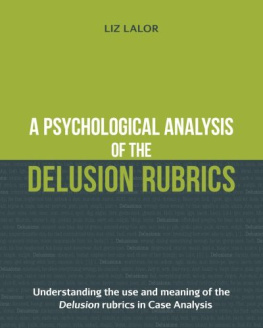Miracles and healing? They start with correcting the slightest imbalance in your body. Who is in a better position than you to respond to subtle emotional and physical changes in your own body? Your quest for health and longevity, a primary concern for all of us, starts with the help of this book.
When it comes to suffering, the division between allopathy (Western medicine) or homeopathy is of no importance. There are only patients who want relief from their suffering. It is for these people that this small book is intended. When a classical Western treatment is insufficient, or when patients simply want to be part of their healing process and add an excellent means of first aid to their armory, The Peoples Repertory can be a good source of information.
This manual does not pretend in any way to substitute for the family doctor or primary care physician (see Part One). No book can replace a physicians care. The reader of this book must realize the importance of an exact diagnosis which often does not fall within the laypersons domain. For this reason, this book covers acute, self-limiting conditions, to guide you while you are waiting for
Taking the Remedies: Frequently Asked Questions
What is homeopathy?
How to take the remedies
What potency to use
Side effects
How do we know that it works?
Homeopathys best-kept secrets
W hat is homeopathy?
Homeopathy is a scientific method of medicine developed by the German physician Samuel Hahnemann (1755-1843), based on several eternal laws of nature. The first law, Like cures Like or the Law of Similars, had been formulated centuries earlier by Hippocrates, the father of medicine. A simple example: you have food poisoning and another poison, Arsenic, will bring a speedy recovery (in highly diluted homeopathic doses, of course!). A homeopathic remedy creates a similar ( not the same ) artificial disease picture, not the disease itself, but information about the disease which helps the body to organize its defenses. As the bodys vital energy pushes back like a rebound effect against the shadow disease created by the remedy, it also pushes the actual disease from the inside to the outside.
A homeopathic remedy is thus an almost infinitesimally small dose of a medication which if given in a bigger dose to a healthy individualwould provoke symptoms similar to those presented by the patient. Western medical doctors often practice unconscious homeopathy when they give vaccinations and allergy shots. In general, Western medical treatment is successful when it follows this important Law of Similars. Unfortunately, Western science has not activity of these homeopathic remedies has been demonstrated by rigorous scientific studies. All this shows is that we dont know everything yet about physics and chemistry. I think it is exciting for science that there is still so much to discover.
Furthermore, the quality of a medication has nothing to do with the quantity, which is often dangerous. While there might be a current tendency in Western medicine to prescribe lower doses (again, unconsciously coming closer to homeopathy), the conventional practice is to overprescribe to the limit of toxicity, which leads to antibiotic-resistant bacteria and the resurgence of diseases thought to be conquered long ago.
Homeopathy? Oh, yes! a colleague of mine said to me one day. Those little sugar balls all look the same. How can you heal with them? Placebo, autosuggestion, maybe charlatanism, thats what homeopathy is.
This objection to homeopathy reminds me of the resistance Hahnemann, the founder of homeopathy, encountered from the conventional medical doctors in Paris because they were so threatened by his successes. They asked the minister of medicine, Mr. Guizot, not to allow Hahnemann to practice. This was the wise answer of Mr. Guizot:
Hahnemann is a scientist of great merit. Science is there for everyone. If homeopathy is a system without any ground or value, it will fall by itself. If on the contrary it is progress, it will survive and expand in spite of your efforts. And does not the Medical Academy have the mission of advancing science and encouraging its findings?
A wise answer indeed. And as Hahnemann himself said, the truth always prevails. Homeopathy proved its worth in the great epidemics of contagious diseases in the 19th and early 20th century. Hahnemann saved Napoleons army from typhoid and conquered the great cholera epidemic of 1831. During the great
1918 flu epidemic, homeopathic hospitals had a mortality rate of only 3%, compared to 45% in the allopathic hospitals.
On the contrary, Western medical drugs are like movie stars: touted briefly as the latest miracle drug, they are inevitably found to be ineffective or to have unacceptable side effects, and they fade from view after a few years. Homeopathy is here to stay, as long as humankind needs assistance and as long as common sense prevails.
As Dr. Constantine Hering (another giant of homeopathy) said, Do not accept anything without proving it, still less reject anything without trying it. There is nothing better to convince a skeptic regarding the value of homeopathy than the treatment of acute conditions as described in this book.


